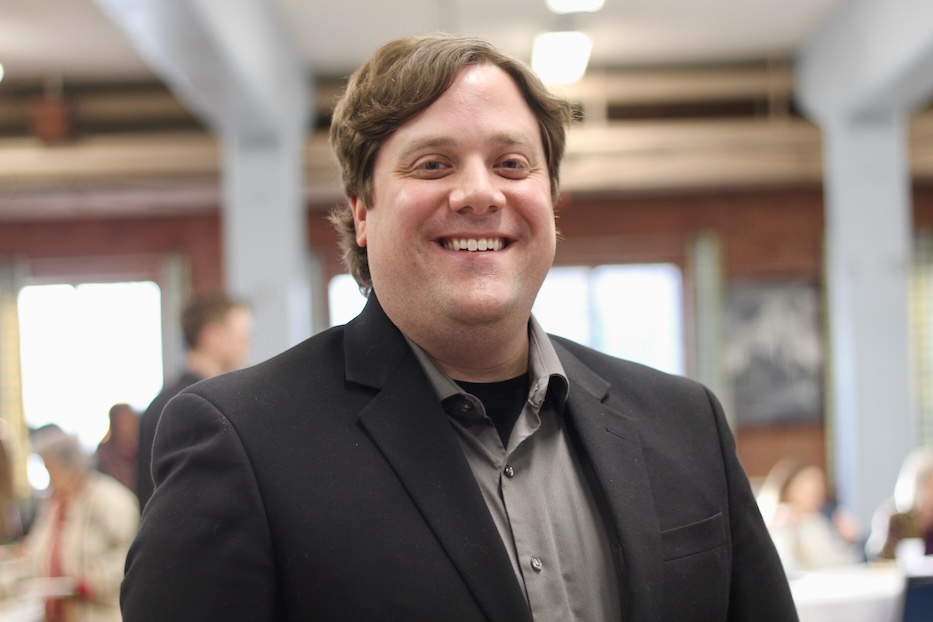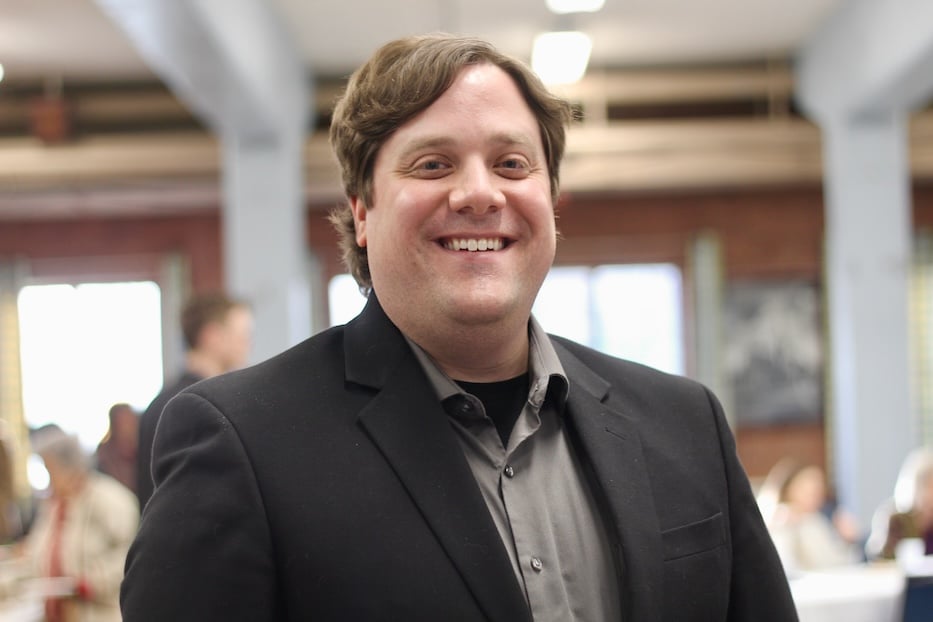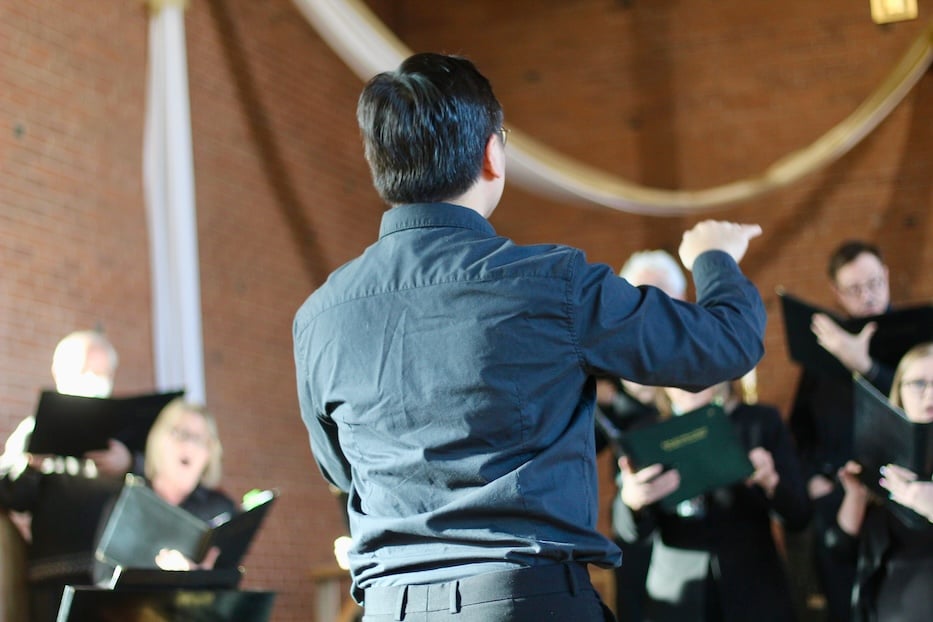
East Rock | Environment | Music | Arts & Culture | Bethesda Lutheran Church

Martin Hebel at a reception following the concert. Lucy Gellman Photo.
The words swelled over Bethesda Lutheran Church, a sermon delivered away from the pulpit. They spilled into the first pews and lapped at parishioners' hands, gathering speed and force. Margaret Astrup’s soprano emerged, clear as a bell. Above vocalists and conductor Isaac Lee, a giant fabric butterfly spread its wings, a mosaic of color and light.
Sunday afternoon, that sound came to Bethesda Lutheran Church as part of its music series, a quarterly lineup of benefit concerts that marry faith, artmaking, and social action at the Whitney Avenue church. Held as a fundraiser for Integrated Refugee and Immigrant Services (IRIS), the program featured an hour of music from composer Martin Hebel, whose work addresses climate change, poor and exploitative working conditions, destruction of the natural world and the global migrant crisis.
Bethesda commissioned his final piece, “Between The Tides,” specifically for the concert. In just minutes, the work sews soft, often mournful piano and voice with firsthand accounts of displacement and death from people in the Ganges Delta Region of Bangladesh and Eastern India. Accounts come from the last 14 years, as the pace of extreme weather events has continued to accelerate.
“The goal of my music is what I call socially conscious composition,” Hebel said in a phone interview before the concert. “That is, music which in some way engages societal issues, global issues, issues like climate change or displacement. Especially in works that involve voice, I'm often using those opportunities to amplify the words of people” who otherwise remain at the margins. “I hope these pieces will motivate listeners to press for change.”
For Hebel, the road to socially conscious composition began at Bethesda, where he has attended church since he was a kid (he is a triplet, and his brother Graham and dad Howard still sing in the church’s choir). Growing up in Hamden’s Spring Glen neighborhood, he spent Sundays soaking in music and worship at the church, so much so that “it was one of the touchstones of my music education.”
After learning to read music in high school (“To impress a girl I liked!” he said with a laugh) Hebel pursued music composition at the University of Connecticut and later the Conservatory of Music at Cincinnati College (CCM). As he moved through his education, he realized that there was a way to yoke music and the humanitarian advocacy he had always been interested in.
“My work is inherently tied to my view of the world,” he said—including man-made conflict, upheaval and patterns of displacement that he sees across the globe. In 2020, he received an award from the Presser Foundation that allowed him to interview migrants living in Rome, a stop on a journey that can be deadly and span thousands of miles and years of temporary or nonexistent shelter. For months, Covid-19 temporarily delayed the project. Then he was able to resume his work in the fall of 2021.

After traveling there in fall 2021, he spoke to 33 refugees from 11 different countries. Fellow refugees translated for him, helping him navigate a total of nine languages before the end of the trip. Throughout, Hebel was struck by both the singularity and the commonality of what he was hearing.
“As a student at the time, I did my best to be prepared, but you really can’t prepare for every story,” he said. “What they all said was some version of, ‘Please don’t treat us like we're invisible. Please don’t forget us.’ I was really struck by that common thread.”
That marked the beginning of “Uplifting Unheard Voices,” a collection of work that seeks to amplify voices—mostly nonwhite, mostly poor—that have been and are being pushed to the historical margins. The project has continued to grow: in 2022, Hebel interviewed 13 Ukrainian refugees displaced by violence in their home country. He brought the same sensibility to “Mother of Exiles,” a work that weaves flute and piano into words from Emma Lazarus and May Wedderburn Cannan.
Together, he explained, Lazarus’ “The New Colossus” and Cannan’s “August 1914” give listeners two very different versions of America, one warm and generous and the other wracked with the grief and gloom of incessant death. It was that sharp contrast that drew him to the works, both poems that he stitches together for the libretto of the piece.
It was also that work that also brought him back to Astrup, a soprano and professor at Western Connecticut State University who currently organizes the music series. While Astrup has known Hebel for decades—“since he was born,” she chirped in an interview before the concert—she hadn’t worked with him professionally until 2022, when she and colleagues commissioned “Mother of Exiles.”
The collaboration gave her a chance to see firsthand how much the composer’s musical voice had matured, and to create a space where he could keep growing it. After the church commissioned “Between Tides,” she said, IRIS just made sense as a beneficiary.
“With Martin’s involvement in this kind of music, it just seemed like such an obvious connection,” she said in an interview before the concert. Not only is Bethesda a sanctuary congregation; the church has long been committed to social service organizations that fill an urgent need, like refugee resettlement, homelessness, and food insecurity.
As seven of Hebel’s works came to life Sunday, each turned social action (and Hebel’s observance of the natural world, which is constant and deferential) into a stirring and new kind of worship. After introducing his piece “Serenity,” Hebel himself listened reverently in the front row, his head tilted down and nodding as though he were in prayer.
Commissioned in 2016, the piece draws on Appalachian folk music, building on the tradition with a voice that is also Hebel’s own. “My hope is to evoke the spirit and natural beauty of that region,” he told the audience before musicians sat down to perform the work.
From the moment they did—Tom Hudson on cello, Zachary Hass on bass trombone, and Isaac Lee on piano—a sense of calm fell over the space, listeners transported hundreds of miles with a handful of notes. Cello glided in over the piano, and it was almost as if the instrument was singing, both fiddle-like and human, vocal. Piano responded in kind, so sparse at times it was almost a whisper. Trombone talked back, pausing to think about what it might like to say.
It gave attendees a sense of Hebel’s voice as a composer—not imposing but not shy either, and deeply capable of a kind of musical worldbuilding. Well before premiering “Between The Tides,” listeners could hear it in “Beneath The Seams,” which uses the words of Gilded Age coal miners to show the horror and exploitation of poor, working-class people in 20th-century Appalachia.
Like his most recent compositions, it brings together instrumentals—in this case, the full, low-bellied weight of two trombones—and voice to tell a story that is instantly relatable, because it is so very human.
As they played, trombonists Anna Franz and Zachary Hass conjured a thick, mournful web of sound, and listeners shifted in their pews, letting it surround them. Baritone Dan Satter sang out He was my brother, now charred and gilded in anthracite!, and laid bare the human toll of mining, the extraction of precious materials from the earth that still causes death and destruction today.
By years I’m only 35, but to see me you’d think me much older, he continued, and it was not hard to think of all the harm that coal mining has brought upon families in Appalachia, where both cancer rates and chronic lung disease have skyrocketed with the continued demands of industry. I am one of hundreds you see on the street every day, Satter continued, and a listener could close their eyes and see the heavy human weight of copper and cobalt mining in Congo, diamond mining in Angola, Guinea, and Sierra Leone, tantalum in the DRC.
What Hebel does, in other words, is make people care in a way that is neither sanctimonious nor preachy. In “Mother of Exiles,” soprano soared over flute and piano, its edges barbed with the weight of Cannan’s words and soft with the possibility of Lazarus’.
A soldier turned to sleep that night/who would not wake for the day, Astrup sang, and it was easy to make the leap to America’s running tally of man-made wars, the trail of death in its wake. As flute and piano—props to musicians Kerry Walker and Laurel Larsen—built around the words, each line hung in the air, eerie and exquisite.
So too in “Between The Tides,” Hebel’s first work to directly and specifically address the plight of climate refugees. As Bethesda’s choir gathered in the church’s crossing, Hebel looked out over the audience, face open and expectant. Lee lifted his arms to conduct, and the choir began, voices lifted in a sort of elegiac hymn. We lived on a riverbank beneath green trees, they began, and listeners could see a village teeming with life, boats gliding through the water as farmers harvested rice and vegetables in the low-lying land.
Then Astrup’s soprano cut through, narrating a life that had been washed away. I remember the day our village vanished, she sang, and it became hard not to feel a knot in one’s stomach, the pain of knowing what was to come. Suddenly the sky grew dark and heavy with rain. Note by note, she summoned the image of a village in crisis, a growing graveyard. Many people have gone, displacement and death everywhere, the choir sang moments later, and a collective sense of urgency buzzed through the air.
The piece could not come, perhaps, at a more pressing time. Each year, 24 million people are displaced in the wake of extreme weather events, according to the International Displacement Monitoring Centre. How they are displaced, and by what, meanwhile, is defined by a growing inequity. Around the globe, people most likely to suffer the immediate consequences of climate change are some of the least responsible for its causes, including carbon and methane emissions and the burning of fossil fuels.
“People of this region are blameless victims of our changing climate—more frequent and violent storms, widespread drought, crop failures, and rising sea levels—despite having done little to cause it,” Hebel wrote in the program notes.
In the face of it, Hebel urges his audience to take action—to add their own voices to the call for carbon regulations, more fully supported refugee resettlement programs, less manufacturing and deforestation that is causing the planet to warm precipitously. Sunday, the question that lingered in the air after the choir had finished was not just What will happen to these people? but also What can I do?
That answer, it seemed, was written across the composer’s face as the choir finished, and the audience came to its feet in a gradual, cacophonous standing ovation. At the front of the church, Hebel clasped his hands over his heart, eyes wide. He gave a little bow, and then another. He beamed, mouthing the words thank you—and then took everything in. It was as if to say it was only the beginning, and there was so much work left to do.

